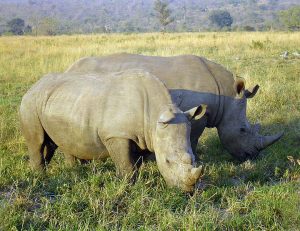
White Rhino pair in South Africa
Image by Komencanto, released in the Public Domain
As most of the world sits at home, obeying the imposed lockdown strategy set in place to combat COVID-19, the world has been seeing unprecedented drops in the air pollution levels and wildlife returning to areas they have not occupied in years. However, not all the wildlife on the Earth is benefitting from decreased human presence outside. Tourism has seen a complete halt around the world and, surprisingly, has come with devastating effects to the wildlife.
Rhino poaching has always been a major threat to the already low rhino populations stretched across Africa and India. Normally, with the presence of tourists within areas of the rhino’s habitat, poachers were limited in when and where they could poach rhinos to avoid exposure. Now, with tourism halted during the pandemic, the illegal poachers can move into areas normally occupied by the tourists and go almost completely unnoticed. This allows for greater, and easier, access to the endangered rhinos. Additionally, the profit gained from tourism often funded conservation efforts, which have now faced severe cuts and can no longer work as efficiently at protecting these rhinos. A report by the New York Times stated that, since the start of the lockdown in late March, in South Africa, at least nine rhinos have been poached, and in Botswana, at least six rhinos have been poached.
It is estimated that only around 4,500 black rhinos are left across Africa and they are on the verge of extinction. Within the Okavango Delta in Botswana, it is estimated that fewer than 20 black rhinos are left. In response to the increased poaching activity, Botswana’s Ministry of Environment, Natural Resources Conservation and Tourism with the aid of Rhinos Without Borders is attempting to evacuate the remaining critically endangered black rhinos to safety to an undisclosed location for protection. For the South African rhinos, the story is no better. Nico Jacobs, the founder of the anti-rhino poaching nonprofit in South Africa that rescues in-need rhinos called Rhino 911, has been seeing incidences nearly every day since the lockdown began.
In India, the same increase in poaching of rhinos has been observed. The World Wildlife Fund reported that there are close to 3,500 Greater One-Horned Rhinos (or Indian Rhinos) residing across the northern part of the Indian sub-continent. One of these rhinos was recently poached in a well-known national park, Kaziranga National Park in early May. This was the first poaching incident of the year. Park officials say that the poaching efforts for these rare rhinos have increased during the lockdown, as the rhinos have moved more towards the boundaries due to the decreased human presence, placing them at a higher risk. In April, park rangers stopped more than five poaching attempts of the Greater One-Horned Rhino.
With these animals already vulnerable to extinction, action must be taken in order to ensure their safety and prevent additional poaching incidents even amid this pandemic. Rhinos are a vital part of the African and Indian ecosystems and most species are already listed as critically endangered, all for their prized horns. Whether it be evacuating the rhinos to safety, as is the case with Botswana, or efforts to cut down on the illegal sales of rhino horns in the black market, efforts need to continue during this time or there will be no more rhinos left to protect.
To help or learn more about these rhinos, check out Rhino 911: http://www.rhino911.com/

 Follow
Follow